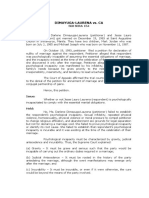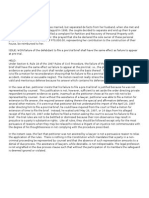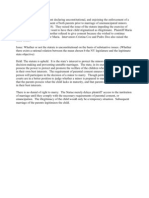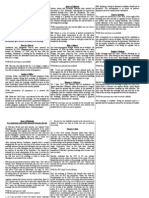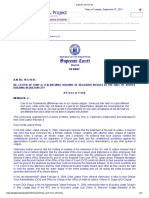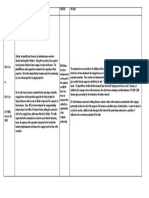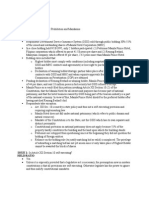0 ratings0% found this document useful (0 votes)
137 viewsTing v. Velez-Ting
Ting v. Velez-Ting
Uploaded by
Verlin Amarante EntenaThe Supreme Court denied Carmen Velez-Ting's petition to nullify her 18-year marriage to Benjamin Ting. While Carmen alleged that Benjamin was a habitual drunkard, gambler, and refused financial support, the Court found this insufficient to prove any pre-existing psychological defect. Two psychiatric evaluations also conflicted on whether Benjamin had a personality disorder. Given the presumption of marriage validity, the evidence did not adequately prove Benjamin was psychologically incapacitated at the time of marriage.
Copyright:
© All Rights Reserved
Available Formats
Download as DOCX, PDF, TXT or read online from Scribd
Ting v. Velez-Ting
Ting v. Velez-Ting
Uploaded by
Verlin Amarante Entena0 ratings0% found this document useful (0 votes)
137 views1 pageThe Supreme Court denied Carmen Velez-Ting's petition to nullify her 18-year marriage to Benjamin Ting. While Carmen alleged that Benjamin was a habitual drunkard, gambler, and refused financial support, the Court found this insufficient to prove any pre-existing psychological defect. Two psychiatric evaluations also conflicted on whether Benjamin had a personality disorder. Given the presumption of marriage validity, the evidence did not adequately prove Benjamin was psychologically incapacitated at the time of marriage.
Original Description:
Ting v. Velez-Ting
Copyright
© © All Rights Reserved
Available Formats
DOCX, PDF, TXT or read online from Scribd
Share this document
Did you find this document useful?
Is this content inappropriate?
The Supreme Court denied Carmen Velez-Ting's petition to nullify her 18-year marriage to Benjamin Ting. While Carmen alleged that Benjamin was a habitual drunkard, gambler, and refused financial support, the Court found this insufficient to prove any pre-existing psychological defect. Two psychiatric evaluations also conflicted on whether Benjamin had a personality disorder. Given the presumption of marriage validity, the evidence did not adequately prove Benjamin was psychologically incapacitated at the time of marriage.
Copyright:
© All Rights Reserved
Available Formats
Download as DOCX, PDF, TXT or read online from Scribd
Download as docx, pdf, or txt
0 ratings0% found this document useful (0 votes)
137 views1 pageTing v. Velez-Ting
Ting v. Velez-Ting
Uploaded by
Verlin Amarante EntenaThe Supreme Court denied Carmen Velez-Ting's petition to nullify her 18-year marriage to Benjamin Ting. While Carmen alleged that Benjamin was a habitual drunkard, gambler, and refused financial support, the Court found this insufficient to prove any pre-existing psychological defect. Two psychiatric evaluations also conflicted on whether Benjamin had a personality disorder. Given the presumption of marriage validity, the evidence did not adequately prove Benjamin was psychologically incapacitated at the time of marriage.
Copyright:
© All Rights Reserved
Available Formats
Download as DOCX, PDF, TXT or read online from Scribd
Download as docx, pdf, or txt
You are on page 1of 1
Ting v.
Velez-Ting (March 31, 2009)
FACTS
7/26/1975: Petitioner Benjamin Ting married respondent Carmen Velez-Ting (whom he met in
1972 in medical school).
They resided at Carmens family home, and Benjamin would later work for Velez Hospital owned
by Carmens family.
After 18 years of marriage, Carmen filed a petition for declaration of nullity based on Article 36
of the Family Code, citing that Benjamin was a habitual drunkard and a gambler, and that he
would refuse to give financial support to his family.
Lower court declared marriage null and void, referring to Dr. Onates findings that Benjamin was
psychologically incapacitated to comply with essential obligations of marriage. Said decision was
sustained by the Court of Appeals although having initially reversed it.
ISSUE
Whether or not the husband was psychologically incapacitated.
RESOLUTION
NO, Benjamin is not psychologically incapacitated. As such, Carmens petition is denied and their
marriage cannot be nullified.
There is no abandonment of the doctrine of Molina (which outlined 8 guidelines for interpretation
and application of FC Article 6). It is merely suggested that these stringent requirements be
relaxed, particularly on the guideline on expert opinions which are not in all cases available to the
parties. Also, the need for expert opinion is not a sine qua non condition in granting petitions for
nullifying marriages.
In this case, since the parties have full capacity to avail of expert opinions, then these should be
presented and accordingly weighed in court.
Carmen failed to prove that petitioners defects were present at the time of the celebration of their
marriage. Prior to their marriage, she already knew that he would occasionally drink and gamble,
but such is insufficient to prove any pre-existing psychological defect that is incurable.
Evaluation of two psychiatrists do not strengthen respondents allegations. Dr. Onate testifies that
petitioners behavior is a positive indication of a personality disorder while Dr. Obra maintained
that there is nothing wrong with his personality. Greater weight should be afforded to the latters
testimony since it had additionally considered a report by a psychiatrist in South Africa who
personally examined Benjamin, as well as Obras interview with his brothers.
Presumption always favors validity of the marriage. In this case, the evidence of psychological
incapacity is inadequate to declare Benjamin psychologically incapacitated.
You might also like
- Villanueva Vs Villanueva - G.R. No. 29959. December 3, 1929Document2 pagesVillanueva Vs Villanueva - G.R. No. 29959. December 3, 1929Ebbe Dy0% (1)
- Us V Windsor DigestDocument1 pageUs V Windsor DigestLayaNo ratings yet
- Crimpro Cases 1Document35 pagesCrimpro Cases 1Kim Angelie TapicNo ratings yet
- JjjjpokmlDocument1 pageJjjjpokmlNoo NooooNo ratings yet
- Pugeda Vs TriasDocument2 pagesPugeda Vs TriasMczoC.Mczo100% (1)
- Molina DoctrineDocument1 pageMolina DoctrineMoujeck Olayvar Cabales100% (1)
- Madridejo v. de LeonDocument2 pagesMadridejo v. de Leoncmv mendozaNo ratings yet
- Case Digests - Effects of Property Relations de Facto SeparationDocument7 pagesCase Digests - Effects of Property Relations de Facto SeparationBeatriz VillafuerteNo ratings yet
- Wiegel V Sempio-DiyDocument1 pageWiegel V Sempio-DiyJohn Fredrick BucuNo ratings yet
- 6 Dimayuga Laurena V CADocument1 page6 Dimayuga Laurena V CAVida MarieNo ratings yet
- Saguid VsDocument1 pageSaguid Vskiella11No ratings yet
- Rep V CantorDocument2 pagesRep V CantorTorrecampo YvetteNo ratings yet
- Madridejo v. de LeonDocument4 pagesMadridejo v. de Leondenver41No ratings yet
- Property Relations Case Digests MCVINDocument21 pagesProperty Relations Case Digests MCVINVeen Galicinao FernandezNo ratings yet
- R9 CivPro Brondial NotesDocument27 pagesR9 CivPro Brondial NotesMaria Luz LiteNo ratings yet
- Anonuevo vs. JalandoniDocument2 pagesAnonuevo vs. JalandoniAl RxNo ratings yet
- Austria vs. NLRC DigestDocument4 pagesAustria vs. NLRC DigestKhen TamdangNo ratings yet
- Legal Writing EssentialsDocument4 pagesLegal Writing EssentialsdaryllNo ratings yet
- Decided by Board: Septemixr 12, 1978Document2 pagesDecided by Board: Septemixr 12, 1978Joanna ENo ratings yet
- Persons HW # 6Document19 pagesPersons HW # 6Pouǝllǝ ɐlʎssɐNo ratings yet
- Republic vs. TampusDocument2 pagesRepublic vs. Tampuslordj zaragozaNo ratings yet
- Hernandez Vs SantosDocument2 pagesHernandez Vs SantosAllen SoNo ratings yet
- Moe v. DinkinsDocument1 pageMoe v. Dinkinsroberto_rañesesNo ratings yet
- Lim V Sta. Crus-LimDocument3 pagesLim V Sta. Crus-LimMonica Salvador100% (1)
- Facts:: People Vs GalitDocument5 pagesFacts:: People Vs GalitNes MejiNo ratings yet
- 204 Moe v. Dinkins SeneresDocument2 pages204 Moe v. Dinkins SeneresChescaSeñeresNo ratings yet
- Garcia Vs SantiagoDocument2 pagesGarcia Vs Santiagoangelica po100% (1)
- 09 Roque vs. Balbin, AC No. 7088, December 4, 2018Document4 pages09 Roque vs. Balbin, AC No. 7088, December 4, 2018DeniseNo ratings yet
- Republic Vs Manalo GR No. 221029Document3 pagesRepublic Vs Manalo GR No. 221029Jimenez LorenzNo ratings yet
- Digest - Wigel Vs Sempio DiyDocument1 pageDigest - Wigel Vs Sempio DiyBEATRIZ FRANCHESKA BURGOSNo ratings yet
- Romulo V YniguezDocument2 pagesRomulo V YniguezEzra Hilary CenizaNo ratings yet
- Digest Crim - NikkoDocument9 pagesDigest Crim - NikkoLester BalagotNo ratings yet
- Wiegel vs. Sempio-DyDocument1 pageWiegel vs. Sempio-DyAllen SoNo ratings yet
- Valdez V RTC 260 SCRA 221Document1 pageValdez V RTC 260 SCRA 221Lei Jeus TaligatosNo ratings yet
- Ayala Investment Development Corporation Vs Court of Appeals (CA)Document3 pagesAyala Investment Development Corporation Vs Court of Appeals (CA)Girlie SandiganNo ratings yet
- Ruling of The Department of JusticeDocument5 pagesRuling of The Department of JusticeAli NamlaNo ratings yet
- Choa vs. ChoaDocument3 pagesChoa vs. ChoaAdah FeliciaNo ratings yet
- Topic: Consent Freely Given Acts: Case Facts Issues RulingDocument1 pageTopic: Consent Freely Given Acts: Case Facts Issues RulingA M I R ANo ratings yet
- 3.republic vs. CA and MolinaDocument1 page3.republic vs. CA and MolinaBon YuseffNo ratings yet
- De Asis v. CaDocument2 pagesDe Asis v. CaGirlie SandiganNo ratings yet
- Voidable MarriagesDocument2 pagesVoidable Marriagescmv mendozaNo ratings yet
- Valdes Vs RTCDocument2 pagesValdes Vs RTCFrancise Mae Montilla Mordeno100% (1)
- Navarro Vs Cecilio-NavarroDocument2 pagesNavarro Vs Cecilio-NavarroCarlota Nicolas VillaromanNo ratings yet
- Stronghold Insurance V Republic AsahiDocument1 pageStronghold Insurance V Republic AsahiRogelio Rubellano IIINo ratings yet
- Matudan vs. Matudan Case DigestDocument4 pagesMatudan vs. Matudan Case DigestEdward Allen AcevedoNo ratings yet
- RE - LETTER OF TONY Q. V ALENCIANO A.M. No. 10-4-19-SCDocument12 pagesRE - LETTER OF TONY Q. V ALENCIANO A.M. No. 10-4-19-SCKathleen Ebilane PulangcoNo ratings yet
- Teresita P. Fajardo v. Atty. Nicanor C. Alvarez, A.C.Document2 pagesTeresita P. Fajardo v. Atty. Nicanor C. Alvarez, A.C.ed leeNo ratings yet
- Case Digest - Jarillio v. PeopleDocument2 pagesCase Digest - Jarillio v. PeopleMiguel Joshua Gange AguirreNo ratings yet
- Rodriguez V CADocument6 pagesRodriguez V CAAnonymous vAVKlB1No ratings yet
- Navarro v. DomagtoyDocument1 pageNavarro v. DomagtoyRaymart SalamidaNo ratings yet
- Gayon vs. GayonDocument3 pagesGayon vs. Gayonyana100% (1)
- Zablocki V RedhailDocument2 pagesZablocki V RedhailJuan Rafael SilvaNo ratings yet
- JD 103: Persons and Family Relations Case Digest 1Document2 pagesJD 103: Persons and Family Relations Case Digest 1Lazy Theorist100% (1)
- Marable vs. Marable PERSONS LAWDocument4 pagesMarable vs. Marable PERSONS LAWCoreine Valledor-SarragaNo ratings yet
- Dela Cruz vs. Dela CruzDocument1 pageDela Cruz vs. Dela CruzRogelio Rubellano IIINo ratings yet
- Salientes V AbanillaDocument1 pageSalientes V AbanillaChristian Paul LugoNo ratings yet
- Ting vs. Velez-Ting - Case DigestsDocument5 pagesTing vs. Velez-Ting - Case DigestsRobehgene AtudNo ratings yet
- Ting vs. Velez TingDocument1 pageTing vs. Velez TingPaul BarazonNo ratings yet
- Ting-vs-Velez 2 REVISEDDocument6 pagesTing-vs-Velez 2 REVISEDMichael Angel M MapilesNo ratings yet
- Legres ReviewerDocument3 pagesLegres ReviewerLiene Lalu NadongaNo ratings yet
- In The Matter of The Petition For Habeas Corpus of Roberto Umil v. FIDEL V. RAMOS (July 9, 1990)Document2 pagesIn The Matter of The Petition For Habeas Corpus of Roberto Umil v. FIDEL V. RAMOS (July 9, 1990)Verlin Amarante EntenaNo ratings yet
- Asia Lighterage and Shipping Inc V CADocument2 pagesAsia Lighterage and Shipping Inc V CAVerlin Amarante Entena0% (1)
- Crimes Against Humanity, Defined: Physical Element Contextual Element Mental ElementDocument7 pagesCrimes Against Humanity, Defined: Physical Element Contextual Element Mental ElementVerlin Amarante EntenaNo ratings yet
- Alcantara v. AlcantaraDocument1 pageAlcantara v. AlcantaraVerlin Amarante EntenaNo ratings yet
- Association of Small Landowners in The Philippines v. Sec of ARDocument2 pagesAssociation of Small Landowners in The Philippines v. Sec of ARVerlin Amarante Entena100% (1)
- Manila Prince Hotel v. GSISDocument2 pagesManila Prince Hotel v. GSISVerlin Amarante EntenaNo ratings yet
- Magna Carta Q.ADocument8 pagesMagna Carta Q.AVerlin Amarante EntenaNo ratings yet
- RA 7659 and 9346Document15 pagesRA 7659 and 9346Verlin Amarante EntenaNo ratings yet
- ArticleDocument1 pageArticleVerlin Amarante EntenaNo ratings yet
- DSPC Training MondayDocument5 pagesDSPC Training MondayVerlin Amarante EntenaNo ratings yet
- Teller V DoggeDocument10 pagesTeller V DoggeVerlin Amarante EntenaNo ratings yet









